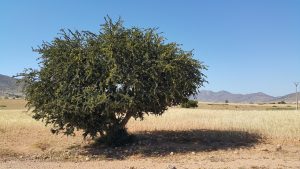Ironwood, shown here, grows in African semi-deserts. Pressing is used to generate Moroccan argan oil extract. The costly golden yellow substance, which tastes like pumpkin seeds, is a valuable cosmetic cure and unrivaled gourmet ingredient.
What exactly is argan oil?
Experts create a particular vegetable oil with diverse applications from the fruits of argania (lat. argania). Gourmets in southwestern Morocco utilize argania oil in their cooking. Because of its therapeutic characteristics, it is utilized in cosmetics. This is one of the rarest oils because the argana plant’s range is highly limited and is protected by UNESCO. Moroccan authorities forbid the export of the tree’s fruit, however it can be shipped to other nations in processed form.
Composition
Unlike olive oil, the composition of argan oil is well-known for its high level of “youth vitamins” E, A, and F. The product contains tocopherols and polyphenols, which are natural antioxidants with anti-inflammatory properties. The presence of very rare compounds, such as sterols, distinguishes argan oil from others. They have anti-inflammatory and desensitizing effects. The remaining compounds are no less beneficial:
Omega-6 and omega-9 polyunsaturated fatty acids, palmitic acid, stearic acid, and ferulic acid; carotenoids; triterpene alcohols; and natural antioxidant squalene.
Properties
Argan oil is used in the treatment of heart and blood vessel illnesses, the musculoskeletal system, to relieve muscle and joint discomfort, infectious diseases, chicken pox, diabetes, and Alzheimer’s disease. Argan oil’s therapeutic characteristics aid in the treatment of dermatological illnesses such as eczema, psoriasis, acne, and acne. The oil extract is used to cure scars, burns, scars, abrasions, and wounds quickly.
It is utilized in cosmetology for complicated skin care, affecting not only the epidermis but also the dermis. It hydrates, nourishes, protects the skin from environmental damage, eliminates wrinkles and lowers their depth, and prevents aging. Argan oil hydrates the cuticle, strengthens the nail plate, and promotes brow and eyelash growth. Hair grows silky, elastic, and strong, with no broken ends.
If you combine everything, you can identify the following effects of the product on the body:
Analgesic, anti-inflammatory, tonic, and antioxidant.
What are the benefits of argan oil?
Argan oil is well-known for its distinct chemical composition. Sterols are essential for the skin and, when combined with oleic acid (omega-9), limit the absorption of toxic cholesterol from the intestines into the blood. The remaining acids are required to activate the body’s defenses, maintain immunity, and improve wound healing. With the help of vitamin E, the benefits of argan oil include ensuring the healthy functioning of the cardiovascular system.
Moroccan oil is recognized for its capacity to quickly infiltrate the blood and bones, it slows the processes of tissue breakdown in rheumatism and arthritis, and it aids with digestive disorders. The magical quality of “liquid Moroccan gold” is the prevention of aging: massage with the product will strengthen the muscle tissue.
Types
Argan oil is classified into three varieties based on its intended application, degree of purification, and method of production: cold-pressed from roasted seeds, cosmetic from unroasted seeds, and cold-pressed from unroasted argan seeds. Because of the high concentration of beneficial components for the human body, roasted seeds are only employed in the food industry, but cold-pressed unroasted seeds are used for medicinal and preventive purposes, though they can also be used in cooking.
Application of Argan oil
Heat treatment is used to create edible oil, which has a dark color and a strong flavor. The bright color suggests that filtration procedures occur often. The product should not be overheated because it would lose all of its helpful characteristics. Breakfast is served with Moroccan amlu paste, which is produced from almonds, argan oil, and honey.
Argan oil is often used in cooking due to its organoleptic qualities. A mild roasting of argan tree fruits yields an amazing hazelnut and almond flavor. Argan oil is commonly used in sauces, seafood, and couscous. Argan oil cosmetic treatments are beneficial not only to the skin, enhancing the condition of nails and hair, but also to the removal of stretch marks during pregnancy.
For the hair
As previously said, Moroccan argan oil for hair is the greatest remedy for removing dullness. It can be used alone or in sophisticated combinations with other components, such as almond oil and hazelnuts. A fantastic remedy for brittle hair and split ends: Instead of balm, 1 tsp argan oil should be applied to the entire length of the hair after washing. To get rid of dandruff, wash your hair and massage the oil into the roots. Rinse your hair, wash, and conditioner after 20 minutes.
If your hair is falling out, you should try a cosmetic argan oil treatment (2 months). To achieve this, apply the product 1-2 times a week at night or 40 minutes before shampooing. The majority of the product is applied to the roots and scalp. 2 tbsp. of oil elixir should be applied before washing the head and left for half an hour to provide UV and humidity protection. Wear a plastic bag and a heated towel. Thoroughly shampoo your hair.
To save face
Argan oil has the advantage of being suitable for all skin types; simply discover your recipe. According to online reviews, for troublesome skin, prepare a mask of argan and almond oil extracts (1 tsp. each), blue clay, and honey (1 tbsp.). The mixture should be diluted with water to the consistency of sour cream before being applied to the skin. Rinse after drying. The process should be repeated twice every 7 days for a month. Argan oil for the face will assist to get rid of flakiness, but first whisk 1 egg white with a mixer and mix it with 1 tbsp of the oil elixir. After 20 minutes, wash off in layers.
For the skin
When it comes to skin damage, the oil elixir is applied directly to burns, wounds, and abrasions. It should be massaged into the skin until the tissues recuperate and repair. Argan oil for skin gives excellent body care; simply add a few drops to your lotion or other products. Stretch marks can be reduced by combining argan (1 tbsp.) and tangerine (10 drops) oil extracts. Add 5 drops to an ordinary cream for smooth hands. The oil elixir is combined with lemon juice to strengthen the nails.
Argan oil-based cosmetics
Argan oil is a source of skin health in cosmetology. Cosmetics that have undergone eco-testing are not damaging to the environment. Plant materials are completely natural, lowering the risk of allergic responses. Organic goods manufactured according to Moroccan recipes are delicate, do not irritate, and do not contain parabens, colors, or chemicals. Numerous good reviews on the use of argan oil attest to its demand and use in beauty salons and natural cosmetics makers.
Mask for Hair
Another component, burdock or castor oil extract, is added to the argan oil strengthening mask for hair (2 tbsp. each). As a quick balm, you do not need to wash your hair: simply moisten your hands with the oil elixir and apply to the hair. Lavender (10 drops), argan (1 tsp), olive (2 tsp), sage (5 drops) oil extracts, and egg yolk are used to make this moisturizing mask.
Cream
To care for the skin’s condition, use an argan oil cream for the face. It is advisable to apply the product separately to certain locations. Argan eye cream reduces wrinkles and gently moisturizes the area around the eyes. You can combine the product with ordinary cream to improve the characteristics of both. To do this, combine 1 teaspoon of argan oil extract with 1 tablespoon of your favorite cosmetics.
How to Apply Argan Oil
Because slightly heated product absorbs better, the jar should be placed in lukewarm water before use. The application of Moroccan argan oil on clean skin aids in the absorption of micronutrients. It is vital to use a scrape to remove all makeup remains from the face. Warm oil extract should be applied to the skin and massaged in. The product absorbs fast because to its light texture, however it is required to clean the remnants with a paper towel after 1 hour. Excess oil elixir shows that the skin has absorbed all of the vitamins it requires.
How to Keep
The product should be stored in a container that is not exposed to direct sunlight. When you buy the oil extract, it is usually already in a dark-colored bottle. The container’s neck should be small, or you could get a drip bottle, so the Moroccan argan oil may be stored for a long period. The product has a shelf life of no more than two years, so if the given storage date is later, it signifies that the product contains chemical additions. A fake can be distinguished in this manner.



